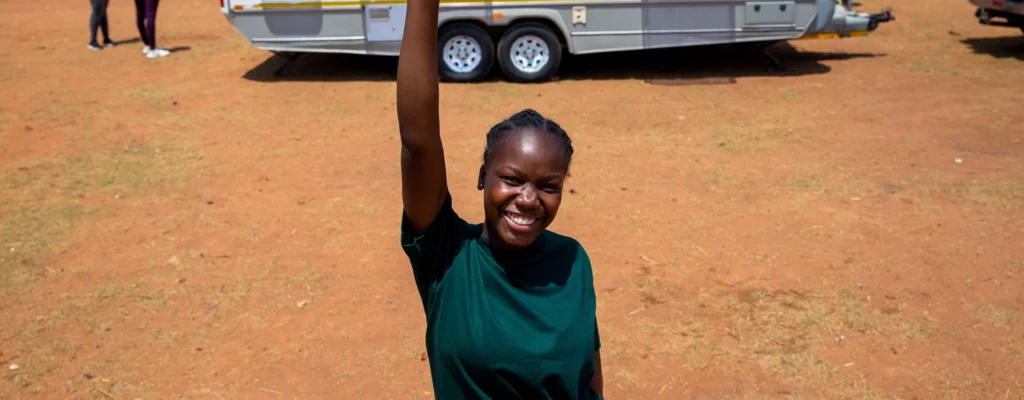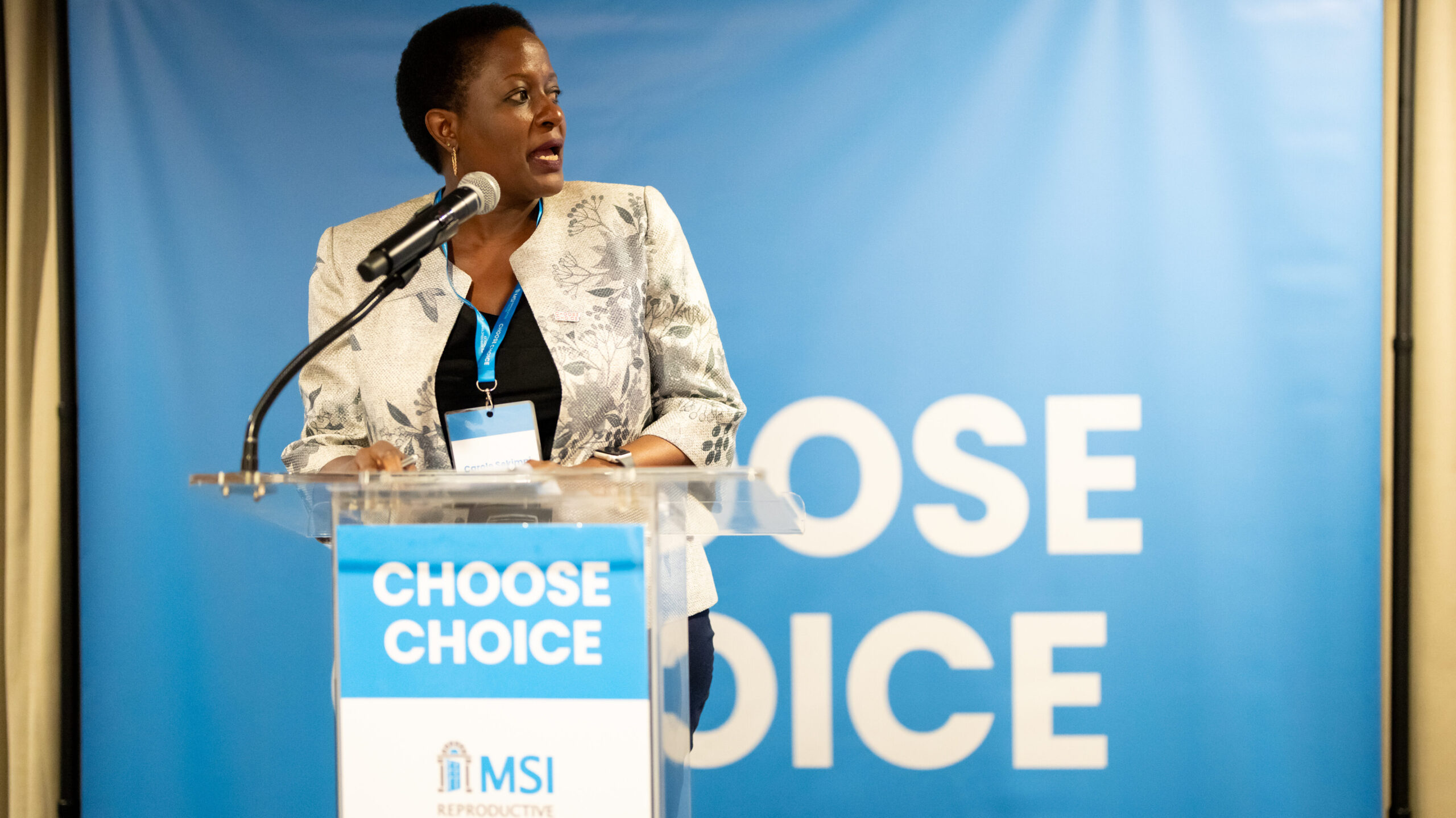Amid disruption from COVID-19, uncertain donor funding, and cuts to existing support, our courageous providers rose to the challenge and delivered a record year of impact.

At the height of COVID, MSI Lady Pragati Soti Khanal, spent four hours at a police roadblock in Nepal persuading officers that the medical abortion pills she was delivering were an essential health service.
While in Zambia, Emmanuel Kanchela refused to abandon his mission delivering contraception to a remote rural community when lions began circling his car.
Courageous providers like Pragati and Emmanuel symbolise the dedication and resilience of MSI Reproductive Choices’ 9,000-strong workforce. Working across six continents, they face a host of different challenges, but whether advocating for buffer zones to protect clients from anti-choice harassment in the UK or protecting access to life-changing contraception on the frontline of the climate crisis in Senegal, they are united by their desire to make choice a reality in their own communities.
As MSI Zambia’s Head of Operations, Inonge Wina-Chinyama puts it:
“If most people had to face lions as part of their job, they would resign, but our teams know how important these services are for women. It’s not just a job, it’s saving a life.”
This spirit is apparent in the remarkable impact MSI achieved in 2021. Last year, thanks to the determination of team members like Pragati and Emmanuel, as well strong partnerships with governments, donors and local communities, we supported 19.4 million people. This includes providing 17.3 million clients with contraception, abortion and post-abortion care services – that’s 67,000 clients every day. We estimate these services prevented more than 14.1 million unintended pregnancies and 6.6 million unsafe abortions, saving the lives of 39,500 women.
As well as reaching more people than ever before, our teams around the world also made progress on our goal of expanding access for people living in the most marginalised communities, showing that equitable access can be delivered at scale. In 2021, 1.7 million of our clients were adolescents and 70% of our contraceptive services were delivered to underserved communities.
Maureen, an 18-year-old MSI client in Zambia told us:

“If it was not for the IUD, I might have dropped out of school due to unwanted pregnancy… Young people have big dreams ahead of them. With contraception, we can achieve our goals.”
The obstacles we faced in 2021 were daunting, not least the continuing impact of the global pandemic and the need to self-isolate during the crisis. But our teams rose to the challenge, innovating and adapting to maintain access. We are proud that in 2021 despite the significant challenges posed by COVID-19, we were able to provide 4 million clients with an abortion or post-abortion care service. That’s equivalent to one in five women seeking an abortion or post-abortion care service in the countries where we work.
MSI Ladies like Pragati provided one solution, quite literally scaling mountains to deliver abortion care direct to people’s doors. Another was the continued rollout of digital innovations like telemedicine, which has supported eligible clients in our UK, South Africa and Ghana programmes to access early medical abortion, counselling and ongoing support from the privacy of their own home.
A more sustainable tomorrow
Innovations like telemedicine have helped protect access to abortion when it was needed most, but we know that some people will always need or prefer surgical care, as demonstrated by our centres where nearly half (45%) of our abortion clients opted for this method. To protect access to a range of options, we are committed to ensuring our 300 centres remain financially sustainable and in 2021 generated enough income to cover 80% of our operating costs, despite the continuing reverberations of the pandemic.
COVID-19 has reinforced the importance of building strong resilient health systems, and alongside making our centres fully sustainable, we are also partnering with national governments around the world to build public sector capacity and advocate for policy changes to expand access to reproductive choice. In 2021, we provided training, support and quality assurance to more than 5,200 public sector health posts around the world, as well as contributing to 10 policy changes at country level. One significant win was the inclusion of family planning services and commodities in the National Health Insurance Scheme in Ghana, which has the potential to transform access for millions of women now and in the future, as well as strengthening the health system. In 2022, we’re committed to doing more to support national ownership of sexual and reproductive health and rights around the world to ensure life-changing services are available for the long term.
An investment not a cost
As we look ahead to 2022 our providers stand ready to respond to the challenges ahead, including the historic verdict expected in the US Supreme Court, which has the potential to not just sweep away abortion rights in America, but embolden anti-choice groups around the world.
At the same time, sexual and reproductive health and rights are facing an existential funding challenge as after a decade of investment, donor priorities and approaches are changing. We passionately believe that choice cannot be given and then taken away but shrinking pots of funding and short-term commitments are putting services at risk and threatening to turn back the clock on sexual and reproductive health and rights. It’s easy to lose sight of what this money could really mean, but for a 15-year-old girl in Niger or Nepal it is the difference between choosing the path her life takes or seeing her hopes and dreams for the future disappear. We call on governments and donors to redefine sexual and reproductive health and rights as an investment not a cost and protect the progress that has been made.
Facing the future with hope
2021 was a year of monumental events, from extreme weather events to the ongoing effects of the pandemic and whatever 2022’s challenges, they’ll require the same collaboration and innovation. We cannot achieve the sustainable development goals and increase gender equality without access to reproductive choice, but we have shown we know how to respond in a crisis and incredible, resilient health workers like Emmanuel and Pragati give us hope for the future. Whether through war or a global pandemic, they will continue working fearlessly to protect progress, improve the lives of their communities and make our world a better and fairer place.
Read more in our two-page briefing – Our Impact in 2021: Going further than ever before to deliver choice.
It only costs £6 per year – or 2 pence per day – for MSI to provide someone with life-changing reproductive healthcare, giving them the power to decide if or when to become pregnant. This reproductive choice helps keep girls in school, supports women to lead, and helps build more equal communities. Support our work to enable reproductive choice globally.








